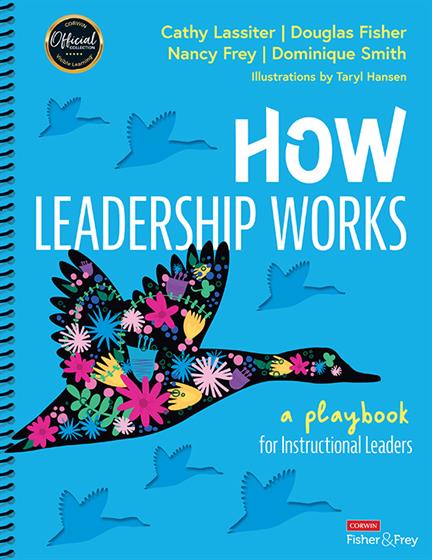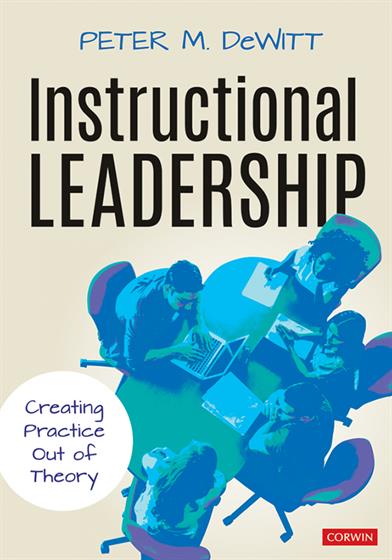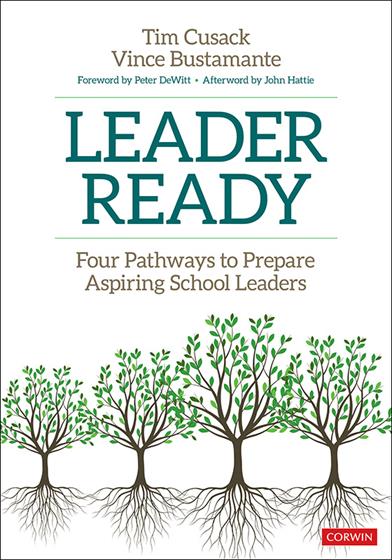Series 6 Leaders Coaching Leaders
[00:00:00.68] ANNOUNCER: Welcome to Corwin's Leaders Coaching Leaders
Podcast, with host Peter Dewitt. This podcast is from education leaders for
education leaders. Every week, Peter and our guests get together to share
ideas, put research into practice, and ensure every student is learning, not by
chance, but by design.
[00:00:19.90] TANYA GHANS: Hey, Peter, how are you?
[00:00:21.67] PETER DEWITT: I'm doing well, Tanya. How are you?
[00:00:24.43] TANYA GHANS: I'm good. It's always nice to see you here on
another session of the Leaders Coaching Leaders Podcast.
[00:00:29.50] PETER DEWITT: Yeah, for sure. It's always good to see you.
[00:00:32.92] TANYA GHANS: And we've been getting some noise. People have
been--
[00:00:36.01] PETER DEWITT: Yeah, so I've actually-- it's been good. I've
been on the road a lot. And I have people either email me. Or I've had people
contact me through Twitter and come up to me during the workshops to say how
much they enjoy listening to the Leaders Coaching Leaders Podcast. And this is
not something you and I often-- well, we've never talked about it actually when
we've-- when we've been on the podcast.
[00:00:57.73] So it's really nice to get some of that feedback from people.
And they're using it in their leadership classes. And they're using it for
assignments and stuff. So it's really great. I love that people are enjoying
the power of the conversations that we're able to have.
[00:01:13.54] TANYA GHANS: Yeah, that's fantastic. I'm really glad to hear
that. And so today, this is probably going to be another episode that can be
used in someone's coursework somewhere to really speak to the present issue of
leader attrition, excuse me. And just finding leaders who are interested in
taking on the role of leading schools.
[00:01:36.56] And so I'm excited to say we have some return guests, Tim
Cusack, who's been an educator for over 30 years. He worked as a superintendent
in Edmonton Schools, where he supported over 100 schools. And now, hot off the
presses, he is currently the dean of education at Concordia University also in
Edmonton. So a wealth of experience in terms of leader preparation.
[00:02:03.50] And Vince Bustamante, coach/content developer who works with
school leaders, really interested in seeing the impact of teachers work on
students. And they came together to write a book, Leader Ready, Four Pathways
to Prepare Aspiring School Leaders. And today's conversation will be all about
this, again, really important issue. I'm excited to have them on.
[00:02:27.52] PETER DEWITT: Yeah, and I think one of the things that we
talked about in the-- in the podcast, people will hear, Tim and Vince have been
working on the book for a while. And the four of us have talked about it for
quite a while. So I'm really proud-- I know it sounds silly to say that, but
I'm really proud of the hard work that they put into it and put it out. I wrote
the foreword to the book, which I'm honored.
[00:02:50.08] But they definitely have a great deal of experience. And Tim
even has this background, he's been in the military for decades as well. He's
been an officer in the military. So he's got all this unique kind of experience
that plays out in how they really want to be able to support leaders. And
that's the conversation that we get into.
[00:03:14.95] You and I were talking offline, they definitely don't like to
call it a pipeline. That is something that we want to make sure that they-- in
fact, they wrote a guest blog for me for Finding Common Ground. And the whole
part of it is about let's not call it a pipeline. So yeah, it's a really good
book. And I think it's something that a lot of leadership-- a lot of schools of
ed leadership would want to be able to use.
[00:03:43.69] TANYA GHANS: Yeah, and I like they really do stress clarity in
getting people ready for the role. Removing the mystery, or the what is it
really mean to be a school leader, or a principal leader. This book is really
good at that the way that they describe it in this discussion, I think, is
super clear. Both Vince and Tim, I think, have a real gift at getting to the
heart of what it is they're trying to do. And chunking it in ways that make it
accessible for the listener and also the reader of their texts. So listeners, I
think you're really going to enjoy this. And again, very timely.
[00:04:18.40] PETER DEWITT: Yes, so enjoy the podcast.
[00:04:20.89] TANYA GHANS: And Peter, I'll see you on the other side.
[00:04:22.39] PETER DEWITT: Sounds good. Tim Cusack and Vince Bustamante,
welcome to the Leaders Coaching Leaders Podcast.
[00:04:32.14] TIM CUSACK: Thanks very much, Peter. It's great to be with you
again.
[00:04:36.04] VINCE BUSTAMANTE: Looking forward to it. Thanks, Peter.
[00:04:38.56] PETER DEWITT: I should say welcome back to the Leaders
Coaching Leaders Podcast because you both have been on before. And everybody
loved the episode. And we definitely wanted you back especially after you know
the book came out that I have. So Leader Ready Four Pathways to Prepare
Aspiring School Leaders, so Tim, I'm going to start with you. Talk to us a
little bit about what made you want to engage in this area. What was-- what was
missing from the dialogue that you wanted to add to?
[00:05:11.14] TIM CUSACK: Thanks, Peter. So in my previous role, I served as
a deputy chief superintendent, a school board of 100 schools and looking at the
professional development of middle leaders and really noticing that something
was missing in their preparation. And largely, that was the voice of our
aspiring leaders asking them what they felt might be important to help them in
their growth and their journey towards school principalship.
[00:05:40.07] And we know we're hearing that attrition rates, retirement
rates are high. And we really need to be far more intentional in creating
conditions that attract our aspiring leaders to step onto those pathways
towards school leadership. So capturing their voice is really important to me.
[00:05:58.40] PETER DEWITT: And Vince, what part did you play in this?
[00:06:01.40] VINCE BUSTAMANTE: I have the aspiring leader perspective, I
guess, is one way to look at it. I've worked with Tim in a couple different
capacities over my career in education and K-12 education. So I was a teacher
when Tim was a principal. And then Tim tapped me on the shoulder to be the
department chair of social studies for a 7 to 12 school.
[00:06:23.24] And then when Tim moved on in his career to assistant
superintendent of curriculum, we call it learning services, which is basically
curriculum, and instruction, and assessment. He again tapped me on the shoulder
to take a leadership position within that department. So Tim's kind of been--
not kind of, Tim has been a guide for me in my leadership development.
[00:06:44.09] And so I wrote-- I've written previous books for Corwin that
focused on implementation. And so I brought with me the lens of a of an
aspiring leader and then a professional who has a focus in implementation and
making things work. So two different lenses came together to write this one.
[00:07:02.67] PETER DEWITT: So I like those words, aspiring leader. And one
of the things that is an interesting juxtaposition, Tim, is we're talking about
aspiring leaders at the same time you were talking about attrition. So why do
people aspire to be a leader and then they don't stay long?
[00:07:21.75] TIM CUSACK: I think when we look at a lot of the most recent
research, we look at work/life balance. We look at the complexities and
challenges of demands from central offices on principals today, when we look at
even aspects of compensation, working conditions, there are a lot of reasons
why somebody might say, I'm not sure this is for me.
[00:07:47.04] And we know that our assistant principals are aspiring
leaders. They're watching their principals very closely. They're seeing what
happens and making judgments sometimes of, well, I don't think I want to do
that. Or hopefully through our four pathways is I see how I can do this with
great impact or effect, I want to do this.
[00:08:09.21] And so we hear the concept of the principal pipeline. Well,
Vince and I argue that that's probably not the best metaphor to use. When you
have a pipeline, you put water, oil, gas, whatever you put at the beginning,
that's what you get at the end. And while, yes, we need a steady supply of
leaders, we feel that there's a way to prepare that increases self-efficacy,
that provides a great set of skills.
[00:08:40.44] And we talk about the skill, will, and thrill of leadership
and what every aspiring leader should know understand and be able to do, and
how to equip principles and systems leaders with processes that can actually
leverage that to guide those aspiring leaders along those pathways to show them
how to realize greater success in the leadership tasks that they have to do.
[00:09:03.15] PETER DEWITT: So can you talk a little bit more, Vince, about
what are the four pathways?
[00:09:08.82] VINCE BUSTAMANTE: Sure, I think too I just want to add
something real quick to what Tim said. I think also the attrition thing is I
think part of it is there's not a-- there's not a as much clarity as we think
there is in what entails leadership as a school leader. It's not dissimilar to
having parents who think they know what happens in the classroom because they
have kids.
[00:09:32.41] I'm in the school with my leader. And I know what that means.
So I can be a leader. And then when we get into the leadership role, we're
quick to kind of say, this is not what I was expecting. So part of the four
pathways-- or the four-- yeah, the four pathways to school leadership preparation
is being clear on what those expectations are.
[00:09:52.83] So our four pathways, the first is understanding, knowing your
leadership standards, whether you have national, or provincial, or local
standards, what are those expectations? The second is how, from an existing
leader position, are you creating or fostering a culture for implementation? So
what does leadership development look like at your at your local site? Who are
your aspiring leaders? That's what Tim mentioned, the skill, will, and thrill.
[00:10:21.79] So if I was coming to your school new from where I live now as
an aspiring leader, what do you know about me before making a judgment on
whether you think I'm capable of being a leader or not? And one of the things
that we noticed when we were writing this book is in that culture, there's-- we
have a lot of second career teachers, teachers coming to the-- to the
profession as a second career. Well, what did they do in their previous career?
And do they have leadership experience that we can leverage?
[00:10:48.22] The third, once we figure out what our standards are and what
the culture is, we have a chapter that we call "Guided Leadership
Experiences," which is our third pathway. And it's basically how are we
creating a gradual release of responsibility model to prepare those aspiring
leaders. So what tasks are we giving them? Are we shedding light on what the
realities of a principalship looks like? And are we allowing those assistant
principals or aspiring leaders to be a part of that?
[00:11:15.91] And then lastly is what we call celebrating and attaining
mastery experiences. So we're working towards mastery always. Mastery is
something that's very difficult to achieve. But it's imperative that we
celebrate those mastery experiences because then that becomes contagious. If I
experience mastery in running a faculty meeting, well then maybe I will have a
little bit more internal motivation to try to help run a PTA meeting or
something like that. So those are our four pathways.
[00:11:43.93] PETER DEWITT: And I like what you said before you started with
the pathways too when you were talking about they're entering into leadership,
but do they really know what they're getting into? And there's research to show
that, especially when you're a building leader, you are in charge of a system.
But you forget that you're a part of a greater system. Tim, you were talking
about 100 schools within your system.
[00:12:08.09] And there's always that kind of rub between the principal, and
the superintendent, or whatever the title might be. And one of the things that
I was wondering, Tim, you're in a new position. You're at the university level
now after many years in K-12. So what are you doing differently in your
position as dean of a university where you're trying to help bridge that gap,
maybe?
[00:12:36.59] Because when I was doing my leadership degree, I took-- I
remember, I was taking a four hour class every Wednesday night. There was
supposed to be every other Wednesday. But that was a way to get two classes
done at the same time, so you take them every Wednesday. And as much as I loved
the professor, one of our classes, he showed us the movie High Noon.
[00:12:54.29] And I thought, oh, this is vaguely inappropriate for school
leadership. It was supposed to be modeling what school leadership looks like.
So are you-- are you showing High Noon, Tim, in your-- in your university
programs? Or what are you doing to kind of bridge that gap between the knowing
and doing?
[00:13:14.12] TIM CUSACK: Well, I would say it's really a shout out to your
work, Peter, is we're looking at those elements of de-implementing. So when we
think of our standards, our teaching standards, our leadership standards,
they're often siloed. And so we're going to stop looking at them as silos.
[00:13:30.62] And so what's important to understand is a beginning teacher
leads a learning community. They are instructional leaders. And those are
attributes that we often see in a leadership standard, but not in the teaching
standard. And so we have-- Vince and I have this mantra of shine some of your
leadership standards on your teachers because if we give them that early
exposure to what leadership attributes look like, what should leaders know,
understand, and be able to do, and leverage that within the teaching context,
the teacher as leader.
[00:14:05.40] And they truly are. And don't think enough light and attention
is shone upon that. And so one of the things I'm hoping to really effect at the
education level with our pre-service teachers is really showing and modeling
for them that leadership isn't just a title. Leadership isn't just a position.
Leadership is intrinsic to who we are as educators.
[00:14:27.93] We want to lead our students to those next destinations. We
want to provide great instructional design, have high impact practices. So by
shining some leadership standard on the development of our teachers, I think we
can achieve that.
[00:14:43.77] PETER DEWITT: I think it also kind of shows the importance of
when you're, say, at the building level, if you have an instructional
leadership team, it shows the importance of making sure that you're valuing the
voices of the people around. Because that's a great spot to really help bring
up that instructional leadership part on the part of teachers as well.
[00:15:07.65] I know that a lot of the work that you both do has been
guided, not just from your experience within the K-12 setting, but also you
have the same experiences that I do, where when you're coaching or you're facilitating
workshops, people, I don't think-- sometimes people that may not write books, I
think they might think you wake up in the morning and you're like, hey, that's
going to be a really good idea. I think I'm going to-- I'm going to write that.
And then I'll find some research.
[00:15:33.66] But what they might not understand is that we get a lot of
information from running workshops and coaching because there are a lot of
common themes that come up. And that's where you start to say, oh, there's something
going on here that I need to explore. That's where good ideas come from for
books.
[00:15:51.63] So in doing this work, over the time you've been doing it,
because you were writing the book for quite a while, and I know that it gave
you also the opportunity, which is fantastic, it gives you the opportunity to
really go deep with the content when you're doing that because you're exploring
at the same time you're presenting. And that leads to a really good book.
[00:16:12.36] So what are some of the things that have come up in
conversations with the both of you with people in workshops or people that
you're coaching when it comes to this work? Is there-- are there a couple of
things that come up more than others? I hope that makes sense when I ask that
question.
[00:16:32.25] VINCE BUSTAMANTE: I can start. I've been very fortunate over
the past few years to do workshops across North America and then virtually
internationally as well, which has been awesome. And a lot of the times, I
think it's the stereotype with aspiring leaders that they have to wait a
certain amount of time.
[00:16:52.62] It's almost like-- so we're talking think about leadership as
a stop on the timeline of our career where it's now I'm ready because the
calendar has flipped. And it's been 10 years that I've been in the classroom.
And I think it's time. And you hear that a lot. I think it's time for me to
move-- and oftentimes, that move is either out of like I'm bored in my
classroom. So I want to move to something new.
[00:17:14.04] Or I'm just ready. And both are OK and not OK simultaneously.
And I think one of the things that's resonated with me in my-- and the
participants in my workshops is I think I was ready a while ago. But I didn't
know I was ready. And so that's the case for me as well in my career.
[00:17:35.09] I vividly remember sitting down with Tim when he was like, I
think you should make this move to the district level. And I specifically said
I don't think I'm ready. I'm young. What's-- how am I going to be perceived as
leading a district level being at a certain age when there's people who have
been teaching longer than I was alive at that point in time?
[00:18:00.95] And it was that recognition from the leader to the aspiring
leader to say, hey, it's not just a time. It's just your development of your
skill. Or I see something in you. So that, for me, was one of the big
resonating things. It's not always a timeline thing. Rather, it can be a
disposition thing that someone needs to see.
[00:18:21.05] So if you're listening to this and you're in that mentorship
role, start letting your aspiring leaders know this is a strength. And yes,
you've only been teaching for five years. But this is something that we can
develop. And when you are ready or when I think you're ready, we can make that
jump into some sort of leadership position.
[00:18:38.64] PETER DEWITT: That's such a great thing to say too. And Vince,
I think we've talked about it before. I had been teaching for maybe three or
four years. And I was doing my master's degree. And my principal had been in
the district for almost 50 years by that time. And he told me that it was a
mistake to get my master's in ed psych from Marist College. And that I should
go back for school administration.
[00:19:00.66] And I said no way. I'm never going to be a school principal. I
couldn't see it. And I don't know if it's because he put the bug in my ear and
three years later, I found myself exploring my leadership degree, or if he saw
something that I didn't see. But I think it's a good point for you to actually
mention that because also one of the-- some of the backlash, I guess, for
principals specifically when they enter into school leadership is people that
they have this kind of ingrained idea of how many years you should be teaching
before you can actually be a school leader.
[00:19:37.86] That's been explored a lot. I've had friends who have talked
to me about the fact that they get pushback because they didn't teach for 10
years before they-- before they became a principal. Or I taught for 11 years
before I became a principal. And there are people that said, well, thank
goodness you had so much teaching experience. So it's interesting to hear you
talk about that piece specifically because you're right.
[00:19:59.70] There isn't this cap of how many years you're supposed to
have. And that, I would venture to guess, why you also were very specific in
calling the book Leader Ready. Tim, how does this impact you? I mean, I know I
asked what you plan on doing at the-- at the university level. But I would
almost venture to guess that writing this book, one, I've known you for many
years now.
[00:20:28.22] We met a few years ago. And you had this wealth of knowledge
because you've had several different leadership positions, not just from a K-12
education level. But you've also-- people might not know that you have a
military background where you've got leadership experience as well. So you've
got two of these.
[00:20:48.99] So all of these ideas are coming into this one book, which is
amazing in general to try to capture all of that. But I would venture to guess
that it almost gives you a sense of urgency. Now that you've got this place
where you've written this book with Vince, is there a sense of urgency in your
position to look at some people that are professors teaching the classes and
say, no, we need to be able to make sure we're doing this, this, and this?
[00:21:16.60] TIM CUSACK: Yeah, there absolutely is urgency. And when we
look at-- we talked about the disposition that people have, do I want to become
a leader? Even like yourself, maybe you didn't see yourself there. And somebody
had that conversation with you that saw those characters and attributes. And I
think that's the urgency when we talk about succession planning. There's also
an element of succession management.
[00:21:39.85] And I think it's important for leaders, school leaders,
systems leaders to understand that we have a big role to play in identifying
those aspiring leaders and creating those conditions for them to find that
success. And that's one of the things I find in facilitating workshops is,
well, you know, Tim, there's a lot of theory out there. There's a lot of what
we should be doing, but not enough about how to go about it.
[00:22:05.20] And Vince and I set out very intentionally to-- from a
practitioner level, of what are some strategies, some approaches that we can
use that give principals the opportunity to authentically engage with their
aspiring leaders? I think the greatest sense of urgency is to talk to those
aspiring leaders and say, what do you need? What do you feel is important? And
one of the big Eureka moments that happens in facilitating workshops or PD with
principals is the simplicity of an approach of understanding where your people
are at, so that they're effective state, understanding the types of
conversations and how to leverage the best out of those individuals through
meditative questions and talking to them.
[00:22:56.03] And Vince touched on the creating those guided mastery
learning opportunities of modeling what great practice looks like and giving
those aspiring leaders a chance to practice it in an environment where they can
learn from mistakes, that they can really get a sense of how to improve that
practice. So the urgency, Peter, really is asking our leaders what they think
will be important to them. And as leaders, closely listening to that, and
supporting that, and we've identified, again, four pathways that I think are
very practical and really will help school leaders, systems leaders do a better
job of meeting those leaders where they're at and really bringing them forward
to greater levels of success.
[00:23:43.88] PETER DEWITT: Well, I think that's a that's a great place to
end. The book is Leader Ready, Four Pathways to Prepare Aspiring School
Leaders. I am honored that you asked me to write the foreword. I've been
excited about this book over the time that you guys have been writing it.
Because I remember when you first approached about writing it, so it's
excellently done. And I think it offers a great deal to the profession. So Tim
and Vince, thank you so much for being on the Leaders Coaching Leaders Podcast.
[00:24:10.46] TIM CUSACK: Thanks very much, Peter. And again, we always appreciate
your guidance and support.
[00:24:14.95] VINCE BUSTAMANTE: Thank you very much, Peter. It was, as
always, such a pleasure to talk to you.
[00:24:21.59] PETER DEWITT: What did you think of the interview?
[00:24:24.02] TANYA GHANS: Oh, I loved it. I love listening to them. Again,
they're so crisp and clear. I think we get really fortunate to have people who
are not just knowledgeable, but take the time to express their ideas in ways
that will land with the listener. And I think that just shows their
thoughtfulness. So I really, really enjoyed it.
[00:24:44.54] And I think there's a line that Tim said that really jumped
out at me, which I have it written down. It's shine some of your leadership
standards on your teachers, which it was so true in that site leaders can
usually-- are usually the first people who start to recognize people who have
the potential to be leaders of a school.
[00:25:08.72] And that in their very, very, very busy days, that they can
start to take the time to notice those people and start to plant the seeds of
maybe this is-- this could be for you. And if it is, let me start revealing to
you what this role looks like and entails, even in small ways. I think that's
probably one of the most efficient ways to at least get people started on the
path. I think even you, you were noticed by one of your school leaders.
[00:25:41.27] PETER DEWITT: Yes, I was, even though I said there's no way
I'd be a principal. Boy, was I wrong a few years later. And yeah, actually, I
just-- I was running a workshop in outside of Dallas, Texas in Richardson. And
it was a kickoff to a one-year program for assistant principals.
[00:25:59.10] And some of them were talking about how they were tapped by
their superintendent or their principal. And they were actually surprised. They
don't have that self-awareness yet when it comes to leadership. And that's
something we were working on. But I think what I appreciate about what Tim and
Vince have done with the book is that very often, building leaders especially
are just kind of handed the keys and it's like, good luck.
[00:26:24.51] And they're really trying to foster that growth from the very
beginning, before maybe you even become-- get that building leader role as
well. And that definitely came through within the interview as well.
[00:26:37.54] TANYA GHANS: And people need practice before they feel
confident to do what they're going to do. And think it's so-- there's so much
common sense in that. Yet when they go into programs, they can get so divorced
from let's actually have you work it out. And again, just get a feel for what
the role is. And even more than a feel, I mean, they talk about going to the
level of giving aspiring leaders mastery experiences.
[00:27:02.68] So they can really have that confidence when they when they
get into the role. And I think if more preparation programs did that across the
board, you'd have more leaders who didn't have that quote, mismatch of
expectations when they when they took it on.
[00:27:17.95] PETER DEWITT: Yeah, I think there's always been kind of this
disconnect between a lot of university programs. That's one of the reasons why
I asked Tim a couple of times about how are you going to do this differently?
[00:27:30.37] TANYA GHANS: Now that you're there, Tim, what are you gonna do
differently?
[00:27:33.19] PETER DEWITT: That's right. Not to put you on the spot, but
you just wrote a book. So--
[00:27:37.36] TANYA GHANS: Yeah, yeah, yeah.
[00:27:38.65] PETER DEWITT: And that was-- that was a good conversation. But
I just think that that word leader is interesting because I think a lot of
people will look and say, well, you're the leader. So you must know it all. And
I think a lot of us are trying to say, we don't. We want to take the lead. But
sometimes what that means is lowering our status and raising the status around
and just-- around us. And just making sure that we are collaborating and
getting the best out of the people around us.
[00:28:08.02] But we never stop learning. So just because we're in a leadership
position doesn't mean we are experts or know it all. It means that we're
willing to take that lead. At the same time, we're-- we know that we have more
to learn.
[00:28:23.00] TANYA GHANS: Yeah, yeah, yeah, I think it's-- last little
thing that just what you said, reminded me of it's in some countries they don't
call school principals, or leaders, either one of those things, or like head
teachers, or just something that keeps them very closely tied to. We're all
doing the same work. I'm just maybe more in a guidance and facilitator role.
But I haven't left this profession. So I think there's a lot to think about in
how we discuss leadership roles in education and maybe writ large. So great
conversation. Listeners, I really hope you learned a lot.
[00:28:55.52] PETER DEWITT: I did. Yeah, it's always good to talk to Tim and
Vince. So thank you for listening. As always, if you have feedback for us, you
can let us know through social media or send us an email. Or come up to me at a
workshop and let me know too. That's always good to hear.
[00:29:13.16] TANYA GHANS: We'll take it. We'll take the feedback.
[00:29:16.31] PETER DEWITT: That's right, we'll take-- I'm-- I have no
shame. If you want to tell us how great the podcast is, please come up and see
me.
[00:29:23.85] TANYA GHANS: Yeah, no problems there. Peter, it's always great
learning with you. Until next time.
[00:29:29.90] PETER DEWITT: Absolutely.











